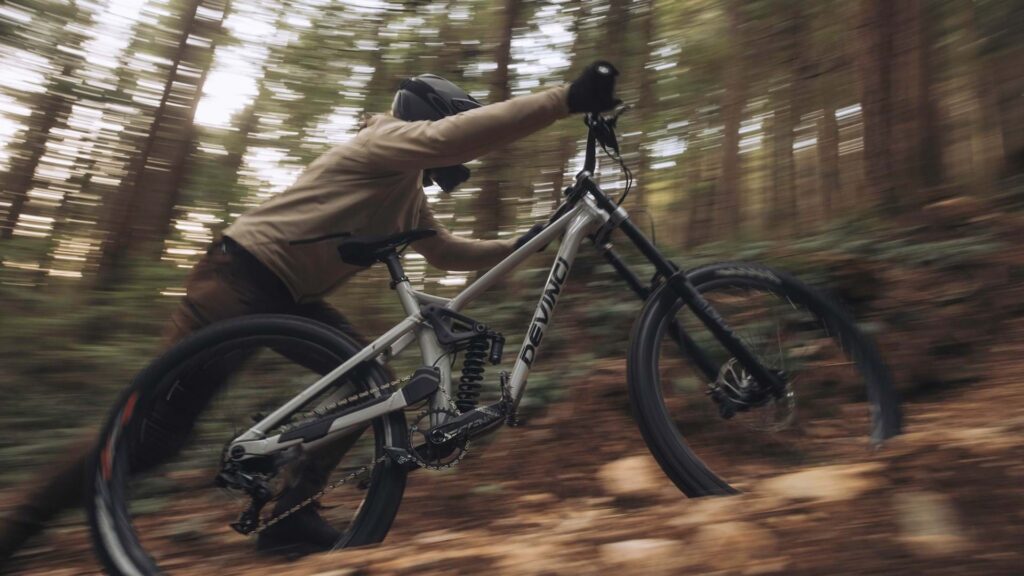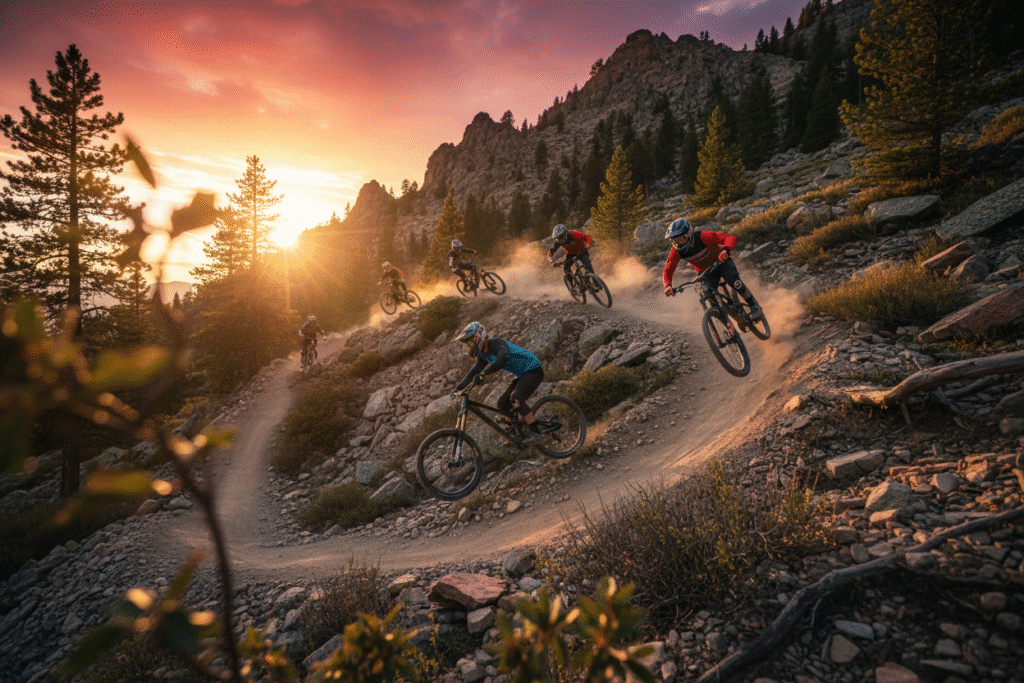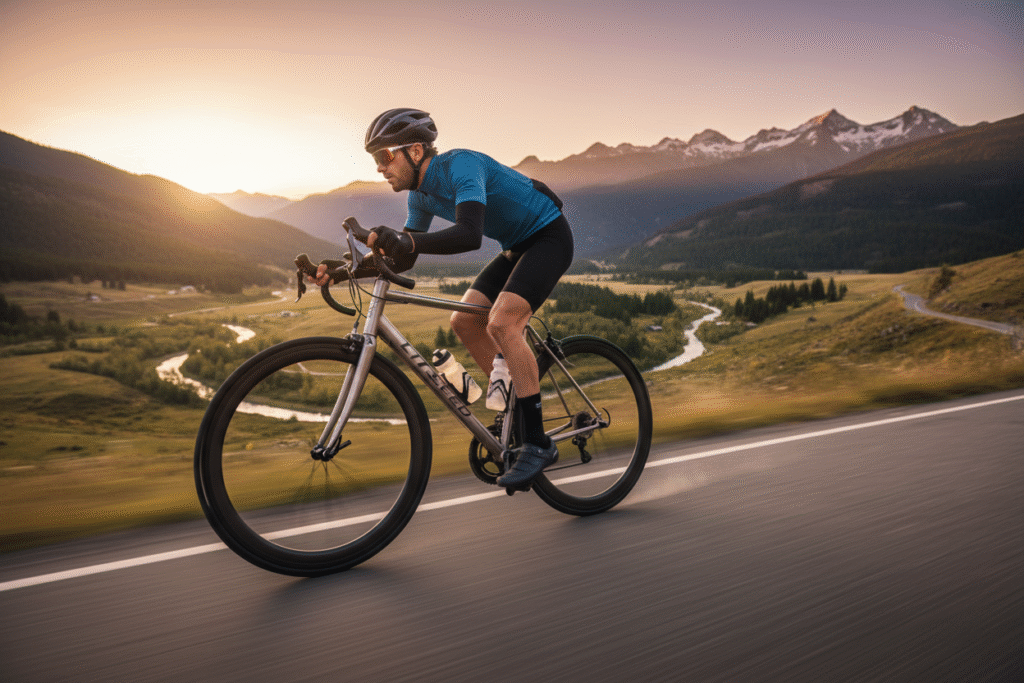Scott Sports is one of the most performance-driven bike brands on the planet. What started in 1958 as a ski equipment company in Sun Valley, Idaho eventually turned into a serious force in cycling, especially from the 1980s onward. Once Scott stepped into bikes, they leaned hard into innovation: early aero components, lightweight carbon frames, race-first geometry, and some of the most successful XC race bikes ever built.
Today, Scott is a true global player. Their bikes show up everywhere from the Tour de France to World Cup XC courses, Ironman events, and technical alpine singletrack. The brand covers road, mountain, gravel, triathlon, and e-bikes—and they don’t just participate in those categories, they win in them.
So where does Scott sit relative to big names like Trek, Specialized, Cannondale, and Giant? Here’s how the brand stacks up in 2026.
A Brief History of Scott Bicycles
Scott didn’t start with bicycles at all.
- 1958: Founded in Sun Valley, Idaho as a ski pole manufacturer.
- 1989: Introduced the iconic aero handlebar that Greg LeMond used in his dramatic 1989 Tour de France victory.
- 1991: Released their first full-suspension mountain bike.
- 2000s: Pioneered lightweight carbon road and MTB frames with bikes like the CR1 road bike and the Spark XC platform.
- Today: Headquartered in Switzerland, Scott has a major footprint in road racing, XC, trail, and triathlon, plus a growing e-bike segment.
From the beginning, Scott’s identity has been tied to technical progression—borrowing ideas from one sport (like aero and composites from skiing and triathlon) and applying them aggressively to bikes.
What Makes Scott Bikes Different?
Scott leans heavily toward the performance end of the spectrum. While some brands split their focus between lifestyle, casual fitness, and racing, Scott’s core identity is very clear: make bikes that are light, fast, and competitive.
Key pillars:
- Ultra-lightweight frames: Their high-end road and XC frames are routinely among the lightest production options available.
- Aero obsession: Bikes like the Foil and Plasma are built around wind-tunnel data and real race feedback.
- Suspension innovation: The TwinLoc system is a signature Scott feature, letting riders adjust ride modes and suspension behavior on the fly.
- Race heritage: From the WorldTour to World Cup XC, Scott-backed riders have a long track record of winning.
- Multi-discipline focus: Road, XC, trail, triathlon, and e-bikes all get serious engineering attention.
In short, if you care about speed, efficiency, and tech-forward design, Scott fits that mindset very well.
Scott’s Most Popular Models
Scott’s lineup is quite broad, but a handful of platforms really define the brand.
Addict RC (Road Racing)
A pure race bike with climbing and all-round performance in mind.
- Featherweight carbon frame and fork
- Aggressive geometry tuned for racing and fast group rides
- Regularly seen in the WorldTour under pro riders
The Addict RC is built for riders who want a bike that feels lively and efficient every time the road tilts uphill.
Foil RC (Aero Road)
Scott’s aero road platform designed to maximize speed in the wind.
- Aerodynamic tube shapes and integrated cockpit
- Engineered for sprinters, attackers, and breakaway specialists
- Combines aero gains with enough comfort for real-world race stages
If you care about watts saved at higher speeds, the Foil RC is the go-to within Scott’s road lineup.
Plasma (Triathlon / Time Trial)
A dedicated tri/TT machine with deep aero integration.
- Highly optimized in the wind tunnel
- Storage solutions for hydration and nutrition integrated into the frame
- Built for triathletes and time trialists chasing every possible second
The Plasma is all about straight-line speed and aerodynamic efficiency.
Spark (XC Mountain Bike)
Arguably Scott’s most famous MTB platform.
- World Cup–proven XC race bike
- Multiple World Championships and Olympic medals (Nino Schurter and others)
- TwinLoc-equipped, letting riders toggle between suspension modes from the bar
The Spark is built for modern XC racing: fast, technical, and demanding.
Genius (Trail / All-Mountain)
A versatile trail/enduro bike aimed at aggressive trail riders.
- Adjustable travel and geometry with TwinLoc
- Capable of big days in the mountains as well as local technical loops
- Balances climbing efficiency with descending confidence
The Genius is for riders who want one bike to handle everything from long climbs to chunky descents.
Scale (XC Hardtail)
Scott’s ultra-light cross-country hardtail.
- Stiff, responsive carbon frame
- Built for fast XC courses, marathon events, and riders who want maximum efficiency
Choose this if you prefer simplicity and raw speed over rear suspension.
Addict Gravel
A race-bred gravel platform that borrows heavily from Scott’s road DNA.
- Lightweight carbon frame
- Geometry suited to high-speed gravel racing
- Comfortable enough for long events like Unbound, but still very performance-oriented
This is more “gravel race machine” than casual explorer.
E-Ride Lineup (E-Bikes)
Scott’s e-bike category spans multiple disciplines:
- E-road and e-gravel models for fitness and long-range rides
- E-MTBs with serious trail and enduro capabilities
- Urban and commuter e-bikes for daily riding
Scott typically uses Bosch and Shimano mid-drive systems, giving their e-bikes strong support and reliability worldwide.
Frame Technology and Innovations
Scott invests heavily in frame engineering and system integration.
- HMX Carbon: Scott’s high-modulus carbon layup—very stiff, very light, used on their top-tier frames.
- TwinLoc Suspension System: A handlebar remote that controls both shock and fork settings simultaneously. Riders can toggle between “Open,” “Traction,” and “Lockout” to match the terrain.
- Aero development: The Foil and Plasma platforms are continuously refined using wind-tunnel data and racing input.
- Integrated cockpits: Clean front ends with hidden cables on road and gravel bikes for aero and aesthetics.
- Weight leadership: The Addict RC and Scale frames consistently rank among the lightest you can buy off the shelf.
The overall approach is very “systems-based”—frame, cockpit, suspension, and components are designed to work together rather than as separate parts.
Who Scott Bikes Are For
Scott’s sweet spot is the performance-focused rider. If you see yourself in any of these groups, the brand makes a lot of sense:
- Road racers & climbers: Addict RC and Foil RC are race-caliber machines.
- Triathletes & time trialists: The Plasma is built specifically for that world.
- XC racers: Spark and Scale have decades of race refinement behind them.
- Trail and all-mountain riders: Genius (and related platforms) offer efficient pedaling with serious descending chops.
- Gravel competitors: Addict Gravel is tuned for speed and long events.
- E-bike performance riders: Scott’s E-Ride line is a good fit if you want modern, well-integrated e-systems.
If your main priority is performance and you enjoy tech-forward bikes, Scott fits that mindset well. If you’re just cruising bike paths occasionally, their lineup is probably overkill.
Price Range
Scott sits firmly in the premium category.
Approximate ranges:
- Entry-level road/MTB: ~$1,200–$2,000
- Mid-range carbon builds: ~$3,000–$6,000
- High-end race builds: ~$8,000–$14,000+
You’re paying for low weight, advanced engineering, and race-proven pedigree. If those things matter to you, the pricing lines up with what you’re getting. If not, there are better value-oriented brands to look at.
Strengths of Scott Bicycles
- Extremely light frames in road and XC categories
- Deep racing heritage across road, XC, and triathlon
- TwinLoc suspension gives Scott MTBs a distinctive edge in variable terrain
- Strong aero expertise in road and TT/tri platforms
- Well-developed e-bike range with reputable motor systems
For riders who want high-tech equipment with real-world race results behind it, Scott checks a lot of boxes.
Weaknesses of Scott Bicycles
- Premium pricing: Often higher than brands like Giant or some direct-to-consumer options.
- Performance-first lineup: Less focused on casual, lifestyle, or cruiser-style bikes.
- Dealer presence (especially in the U.S.): Not as omnipresent as Trek or Specialized in some regions.
- Proprietary systems: Features like TwinLoc and specific integrated parts can make setup and maintenance a bit more complex or shop-dependent.
None of these are deal-breakers for performance riders, but they’re worth keeping in mind if you want simplicity or budget-friendly builds.
Scott vs. the Competition
Here’s how Scott compares to some major players:
- Trek:
- Strengths: Huge dealer network, broad product range, strong tech.
- Vs Scott: Trek is more omnipresent and arguably more approachable; Scott leans a bit more aggressively into pure performance and light weight.
- Specialized:
- Strengths: Heavy R&D investment, big presence in road and MTB racing, strong marketing.
- Vs Scott: Very similar target audience; choice often comes down to fit, feel, and brand preference.
- Cannondale:
- Strengths: Innovative ideas (Lefty, Kingpin), distinct design language.
- Vs Scott: Cannondale’s tech can feel more experimental; Scott’s approach is more traditional but highly refined.
- Giant:
- Strengths: Excellent value, strong availability, manufacturer-scale efficiency.
- Vs Scott: Giant often wins on price-to-spec, while Scott focuses more heavily on ultra-light race gear and proprietary tech.
If your priority is the lightest and raciest possible setup, Scott stands out. If you’re after value or broad versatility, other brands may edge them out.
Rider Feedback
Common themes from Scott owners and testers:
What they love:
- How light the bikes feel, especially on climbs and accelerations.
- The confidence that comes from riding something with proven race pedigree.
- TwinLoc’s ability to transform how a bike behaves on different sections of trail.
- The refined aesthetic and integrated design.
What they complain about:
- The price—no surprise there.
- Complexity around proprietary parts and remote suspension setups.
- Limited availability or sizing in certain markets or shops.
Overall, riders who choose Scott usually do so on purpose—they’re chasing performance, not impulse-buying a bike off the rack.
Is a Scott Bike Right for You?
Scott is a great fit if you:
- Care about performance and weight more than anything else.
- Like tech-forward solutions such as integrated cockpits and suspension controls.
- Plan to race, ride competitively, or push yourself on demanding routes.
- Are comfortable paying more for refined engineering and a race-bred frame.
You might want to look elsewhere if:
- You’re on a tight budget.
- You just want a casual town bike or weekend cruiser.
- Simplicity and easy DIY maintenance matter more than tech features.
For the right rider, Scott delivers exactly what it promises: fast, sharp-handling, modern bikes with serious engineering behind them.
FAQ
Q: Are Scott bikes worth the high price?
For performance-focused riders, yes. You’re paying for very light frames, advanced suspension systems, and platforms proven at the highest levels of racing.
Q: What is the TwinLoc system?
TwinLoc is a handlebar-mounted remote that lets you adjust fork and shock simultaneously—usually between open, traction (reduced travel/firmness), and full lockout modes. It’s designed to make the bike more efficient on climbs and more capable on descents without you having to reach down for shock levers.
Q: Does Scott make good beginner bikes?
They do offer entry-level models, but even those tend to be more expensive than value-focused brands like Giant, Co-op, or some direct-to-consumer options. If you’re totally new and unsure about long-term riding, you might find better value elsewhere.
Q: Are Scott’s e-bikes reliable?
Yes. Scott uses Bosch and Shimano mid-drive systems, which are widely supported, well-tested, and easy to service through many shops around the world.
Related Content:
Why Trust This Review?
BestBikeBrands is built by lifelong cyclists with decades of real-world experience — in the shop, on the trail, and behind the wrench. Our goal is simple: to help riders choose the best bikes and gear with confidence, backed by expert insights and hands-on testing. Learn more about us →






